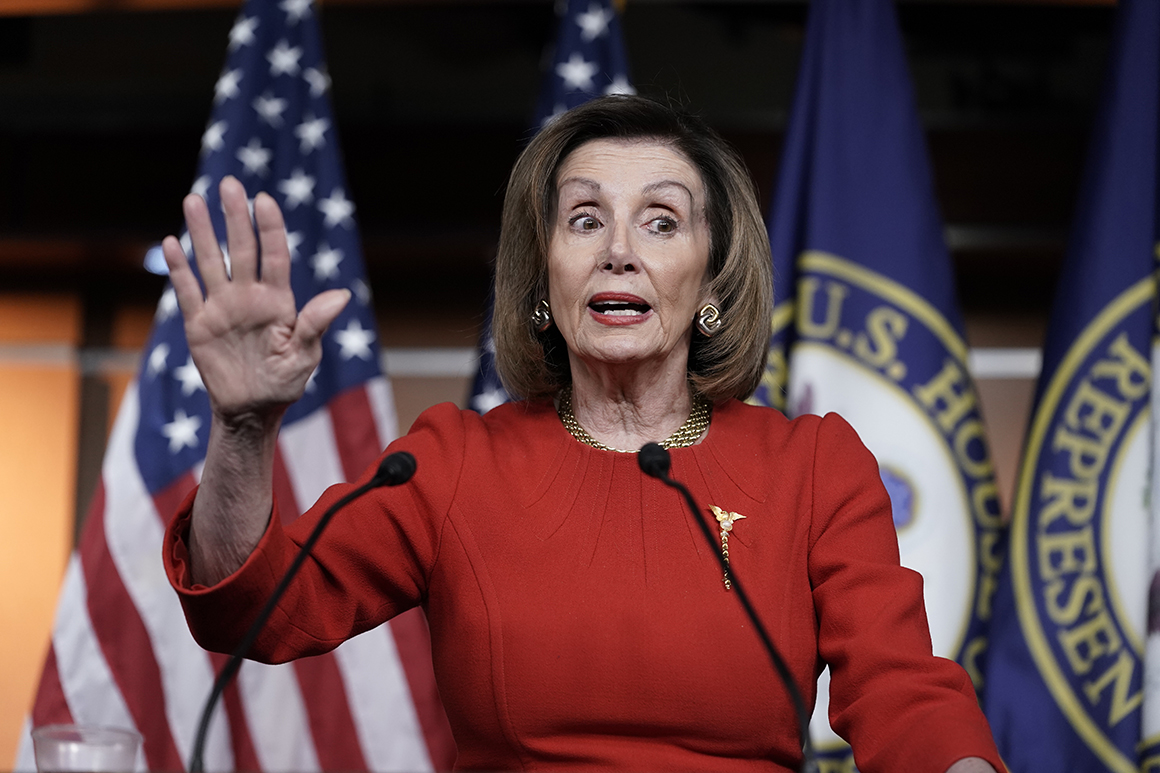
The White House gave zero notice to key congressional leaders about the U.S. drone strike on Qassem Soleimani, who led Iran’s elite Quds force, and which followed days of increasing violence in Iraq, including an attack Tuesday against the U.S. Embassy in Baghdad.
Speaker Nancy Pelosi (D-Calif.) wasn’t informed of the airstrike ahead of time and spoke with Defense Secretary Mark Esper only after the strike. She said in a statement that the deadly action “was taken without the consultation of Congress.”
“The full Congress must be immediately briefed on this serious situation and on the next steps under consideration by the Administration, including the significant escalation of the deployment of additional troops to the region,” Pelosi said. So far, that briefing has yet to be scheduled, according to Democratic aides.
Senate Minority Leader Chuck Schumer (D-N.Y.) also did not receive advance notice of the strike and lambasted Trump for not seeking the advice of Congress. Senate Majority Leader Mitch McConnell (R-Ky.), meanwhile, praised Trump for the move and said he has spoken to Esper, though he, too, wants an all-senators briefing.
Senate and House leadership as well as key committee staff are scheduled to receive briefings from administration officials Friday afternoon. The session was previously scheduled to discuss the earlier attack on the U.S. Embassy in Baghdad.
While most lawmakers were in the dark about Trump’s plans, Sen. Lindsey Graham was a notable exception. The hawkish South Carolina Republican and close Trump ally said Friday he had been briefed on the potential strike while visiting Trump in Mar-a-Lago.
The strike against Soleimani is not the first time Trump has declined to consult with lawmakers before key national security decisions. The administration didn’t give a heads-up to congressional leaders before the raid that killed ISIS leader Abu Bakr al-Baghdadi.
But Trump, more than previous presidents, has cut the opposition party out of the loop. Roughly a dozen Senate Republicans were briefed on the administration’s Syria plans in the White House Situation Room last October; no Democrats were present.
Soleimani’s killing — and the prospect of a widening conflict in the Middle East — renewed calls for Congress to rein in Trump.
Sen. Chris Murphy (D-Conn.), a member of the Senate Foreign Relations Committee, described the killing as “the equivalent of the Iranians assassinating the U.S. Secretary of Defense” and said it was “incumbent upon this administration to come to Congress to get authorization for future military action.”
Sen. Tim Kaine (D-Va.) said Friday he was filing a War Powers resolution to try to force the Senate to debate conflict with Iran.
A few Republicans also called for additional congressional oversight of Trump’s use of force abroad.
Sen. Rand Paul (R-Ky.) warned in a tweet that „a war without a Congressional declaration is a recipe for feckless intermittent eruptions of violence“ and that „our young men and women in the armed services deserve better.”
Lawmakers have made some attempts to claw back authority from the president but all have fallen short.
Congress passed legislation last year to end U.S. support for the Saudi-backed war in Yemen, but Trump promptly vetoed it.
In July, the House approved an amendment to an annual defense policy bill that would have required congressional approval for military action against Iran. But that language, authored by Reps. Ro Khanna (D-Calif.), a top progressive, and Matt Gaetz (R-Fla.), a close Trump ally, was ultimately dropped in negotiations with the Senate, which had previously rejected a similar proposal on the floor.
And though lawmakers in both parties have expressed deep dissatisfaction with the 2001 authorization for the use of military force — which underpins the war in Afghanistan and the many U.S. counterterrorism operations worldwide — there’s little consensus on how to draft a new law.
House Democrats voted last year to repeal the 2001 AUMF as well as the 2002 Iraq War authorization, but neither proposal gained traction in the GOP-controlled Senate.
Most Republicans are reluctant to restrain the president’s authority on military intervention, and they praised Trump for killing Soleimani.
“On behalf of every American serviceman and servicewoman who has either been killed or injured due to an Iranian-provided IED or rocket in Iraq over the years, today justice was done,” said Senate Foreign Relations Chairman Jim Risch (R-Idaho) in a statement.
Risch told reporters on a conference call Friday that Trump had „very clear, very solid information from the intelligence community“ and said the Constitution gave the president „authority to defend the United States when he thought it was appropriate.“ Risch added that he would be „very surprised if someone came up with the magic language“ for a new authorization for the use of military force.
Congress has spent decades relinquishing its power over military intervention, and presidents of both parties have capitalized on the trend.
Even if Congress had passed some sort of law to restrict the president, it’s not clear that Trump — who has eagerly tested the bounds of his legal authority — would have respected it.
John Bellinger, a top lawyer in the George W. Bush National Security Council, said the strike was legal because the Constitution empowered the president to use military force if the country or American interests are at risk.
Secretary of State Mike Pompeo has said Soleimani was planning an “imminent” assault, but Bellinger said Soleimani’s past attacks against the U.S. would still provide a legal basis for the president to act without first going to Congress.
Whether it was legal, however, is irrelevant to whether it was smart.
“It does seem to me that even if this strike was lawful under domestic law, it raises very serious questions about whether this was good policy given the tensions that currently exist in the Persian Gulf region and the potential for retaliation,” said Bellinger. “It’s not at all clear that all of those concerns were thought through.”
Heather Caygle, Burgess Everett, Connor O’Brien and Jacqueline Feldscher contributed to this report.
Source: politico.com
See more here: news365.stream






